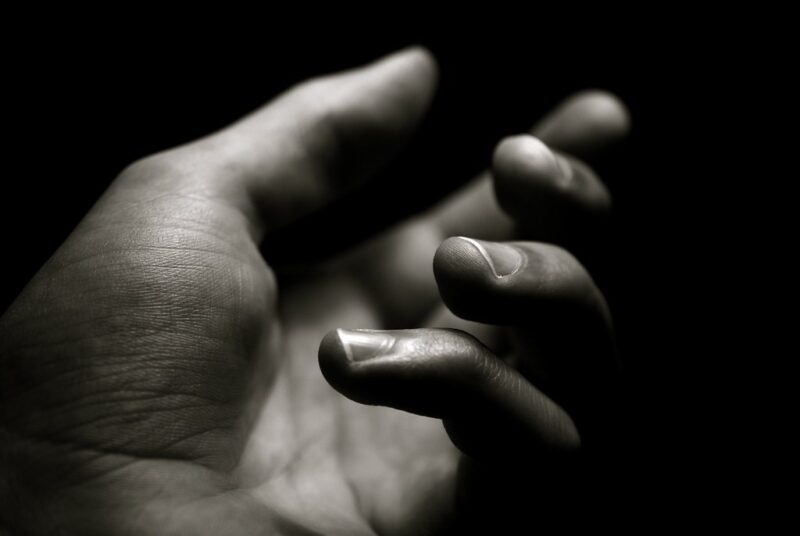I undress and my jumper falls into a warm heap on top of my foot. I am still for a few moments and let it stay there. Like a hand on my thigh would signal that I am someone in proximity to someone else: here is the accumulation of an afternoon, the possibility of myself.
There have been so many times I’ve held myself under the sheets, fallen asleep with both arms wrapped around my sides. I love to lie through slow mornings running my fingers down a landscape of flesh and bone, all of it mine. I know how to draw circles on my forearm so that it becomes charged and pining. I’ve kissed my own shoulders and wrists; not as a child in practice, anticipating their future of entangled pairs, but to feel the weight of me now.
I often imagine another body conducting these movements with an absent-minded curiosity, rather than with the yearning perhaps associated with such solitary intimacy. The actions are affirmations: I’ll shift my gaze so that the part where my arm joins my torso doesn’t fall into it, to remind myself how external things reach me. I nod inside my head and the pillow will stir beneath it. In the mirror I’m not waiting for another face to look back at me, but I’m anticipating what it might mean to be seen.
I am changing my clothes because to dress my body is another form of acknowledgment: the way each fabric holds onto it implies new meaning. There are the tangible essences; crossing my legs in fleecy bottoms that help me curl into foetal position on chilly nights, before stepping into cotton skirts on those first hot days for their patience with the sweat and breeze. There is the turtleneck jumper I hide my nose inside, the raincoat that rubs together like there’s someone following me on drizzly walks, the socks that ease my feet into every morning that wakes from the cool kitchen tiles.
Then there is leather, warm with me in our private spaces, curling up inside my armpits and gathering heat behind its zip, yet icy and creaking to a stranger’s hand that reaches out from the air. With its robust shell reminiscent of defiance, my black leather jacket is something I miss the most. Hanging in an empty entranceway, abandoned in the city where crisis travels fast, it is stripped of these connotations and left vulnerable without somebody to protect. I wear leather in the evenings where drinks overflow and run down my lager-resistant arms to envision being seen as self-assured, resilient; as someone belonging to themselves.
I put on dresses during weekends alone to sit in the garden like their bright patterns and puffed sleeves might leave an impression on the birds. I wear my good trousers to work so that my bedroom desk chair feels like motivation beneath them. I hop bare footed out the front of the house on my tea breaks because to the gravel I am just two disruptive feet. I find new ways to let clothes speak for my body, and for my body to speak to me through the sleeves.
When I discard them, the anticipation that builds as I watch water tumble into the bath is as much to do with getting out of it as it is with getting in. Standing in the lingering steam, my form is hot and malleable, my skin pinched pink all over like its responding to an intake of toxins in a room of people: now I can sink into the night like hundreds of heavy eyes would. My body is a boundary, and I dry my limbs carefully like I’m considering how to punctuate my next transition.
These days the clock’s hands are mine. Sticky with honey at 8 AM, or ticking in a mouth still dry with sleep, telling me it’s time I was quenched. Feeding becomes a way to separate oneself; our lips and days divided. We say things like it’s too early for lunch and turn cocktails into an hour, attempting to line our growling stomachs and unsettled minds up with the world in which they subsist – its hurtling skies and seconds – to imply some control while it spins. We sync our rituals with one another like in a queue for the buffet or the bar. Sitting down to eat, whether or not at the same table, becomes communal. Wine before the day dims becomes a risk: we remind ourselves that to drink has implications, that it could loosen a body’s walls, regurgitating secrets or premature opinions. That our parts can so easily escape the safety of their casing and become property of foreign memory.
In the lull of distance between us, this is what I think of when I find that I’m rubbing my thumb in strokes across my cheek; when I unexpectedly bring my hand up from the page to inhale my palm, not breaking the line I’m reading. I’ve been scratching my face in my sleep lately – dreams of people I can’t hold are carved into my nose. I embody a point of contact: its touch spells out my existence, members twitching morse code into every motionless space.
Zoe Turner works in publishing in Manchester. She is the co-host of spoken-word night ‘Verbose’ and the co-editor of The Book of Newcastle (2020). Her work has previously appeared in Dear Damsels.
Image credit: “help me” by nicdalic is licensed under CC BY-NC-ND 2.0

